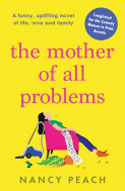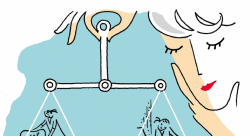 Dr Nancy Peach took a novel approach when her beloved mother was diagnosed with dementia, she tells Kerry Parnell
Dr Nancy Peach took a novel approach when her beloved mother was diagnosed with dementia, she tells Kerry ParnellWhen her mother was diagnosed with dementia, Nancy Peach was devastated. As a doctor, you would think she would be well-placed to cope, but she says that in some ways her medical knowledge made it harder.
However, as the disease progressed she found one thing that helped.
‘There is a lot to be said for being able to laugh in the face of adversity, it’s often the only thing that keeps you going,’ she says. ‘To be able to say: “Look, this is ridiculous”, is one of the most liberating experiences.’
Peach belongs to the so-called ‘sandwich generation’ - people with young children who also have to care for elderly parents. So as the pressure mounted she took a novel approach to her new situation - literally - and began to write.
‘I’ve always used writing and reading as a therapeutic tool,’ says Peach, 47.
‘But when Mum was diagnosed writing came into its own, because I found looking after her was so isolating.’
She began a blog, Mum Has Dementia, sharing her new reality with others in the same situation. When that took off, she decided to write a novel, Love Life, which had the unlikely premise of being a Pride and Prejudice-style romance set in a hospice.
Now she has turned her real-life experiences with her mother’s care into another comic novel, The Mother of all Problems. It tells the story of Penny Baker, a mum of three, who finds herself caring for her mother after she is diagnosed with dementia. The household begins to fall into disarray as Penny tries to meet everyone’s needs.
‘The blog was brutally honest, but then Mum was becoming more and more ill and it was harder to find funny things to write about,’ says Peach. ‘But with fiction you can take it in whatever direction you want. The book I really wanted to write was a comedy based on someone like me.’
The irony of Peach fitting in writing books while juggling work as a GP, being a mum and caring for her mother, isn’t lost on her. So how did she manage to add in another job to her already hectic schedule? ‘Women are generally better at multi-tasking,’ she says. ‘Doctors are also good at multi-tasking. And part-time female GPs with small kids are brilliant at multi-tasking!’
She says that writing helped to keep her sane. ‘While other people might go for a run, sing in a choir or paint, I like to write. I need that escapism.’
Spotting the problem
Peach and her family first noticed a change in her mother when she was in her 50s, but it took time to diagnose dementia because the signs were not obvious at first.
‘We now think it was probably what is called frontotemporal dementia,’ says Peach. ‘It was difficult to know what was going on because her symptoms were odd. It wasn’t a case of her leaving her keys in the fridge or forgetting who the prime minister is. The first time we contacted a memory clinic they were fairly dismissive, and suggested she might have “empty-nest syndrome” or that it was just post-menopausal.’
But things continued to deteriorate. ‘Mum always really loved to talk, but she kept starting stories and being unable to complete them. It was painful.’ Eventually she was diagnosed with mild-cognitive impairment, and while that initially offered some hope, the condition soon got more severe.
‘She was using nonsense words and forgetting to do things,’ says Peach. ‘She had another scan, and that showed signs of dementia. We knew then that she was likely to continue declining at a similar rate and get significantly worse. And she did.’
A surprise to Peach was her mother’s loss of physical ability. ‘I hadn’t fully appreciated how much dementia affects motor skills, the fact that just getting around becomes difficult and basic functions are lost.’ The whole process, she says, was like a ‘slow bereavement’.
The care dilemma
The next step was how to physically care for her mother. Peach and her sister lived near their parents, so were able to help take some of the pressure off her father, then in his early 60s, who had become the primary carer. ‘Mum would stay with me or my sister for a weekend if Dad needed a break,’ she says.
The family quickly learned to reduce their expectations. ‘It meant we couldn’t make any plans, which sometimes is quite nice. The children were fine about it - they didn’t know any different. Mum would help me sort out the washing, which could take hours. I just had to tell myself not to get frustrated.’ While Peach’s mother remained at home, it became clear after a while that the family would need more help. ‘Dad was quite resistant to the whole idea to start off with,’ she says. ‘He’s a very private person, and the older generation sometimes struggle with these diagnoses and how they feel about it. I think he didn’t want to tell us how bad things were - he felt like he was letting her down.’
Peach sought advice from the Alzheimer’s Society. ‘They said that if my parents didn’t have a cleaner, I should arrange to get one, because it would get them used to the idea of having a stranger coming in to help,’ she says.
They then engaged a carer to help take Peach’s mother out for walks. ‘Mum loved her so much, she was just a joy. We ended up needing help to get her dressed, showered, that sort of thing. Obviously, it gets expensive, but we just kept introducing new things gradually.’
Turning her and her mother’s sad story into a lighter tale helped Peach keep perspective. For anyone embarking on the same journey, her advice is to try to enjoy the time you have. ‘You’re always battling sadness, but if I look at the situation objectively, Mum was perfectly happy. She was quite content within her own little world.’
 ◆ The Mother of all Problems is published by Hera Books, price £9.99
◆ The Mother of all Problems is published by Hera Books, price £9.99Directory
Miracle Workers miracle-workers.co.uk, 01873 881306
Mulberry Live-In Care mulberryliveincare.co.uk, 01380 870270
Hampstead Care Group hampsteadcaregroup.co.uk, 020 3092 8489
Access Care access-care.co.uk, hello@access-care.co.uk, 01264 319399
Richmond Care Villages. richmond-villages.com, 01926 679502
Trionic trionic.uk, 0330 029 1378
Easy2bath easy2bathe.co.uk, 0800 083 0036
Stiltz stiltz.co.uk, 0808 304 8585








